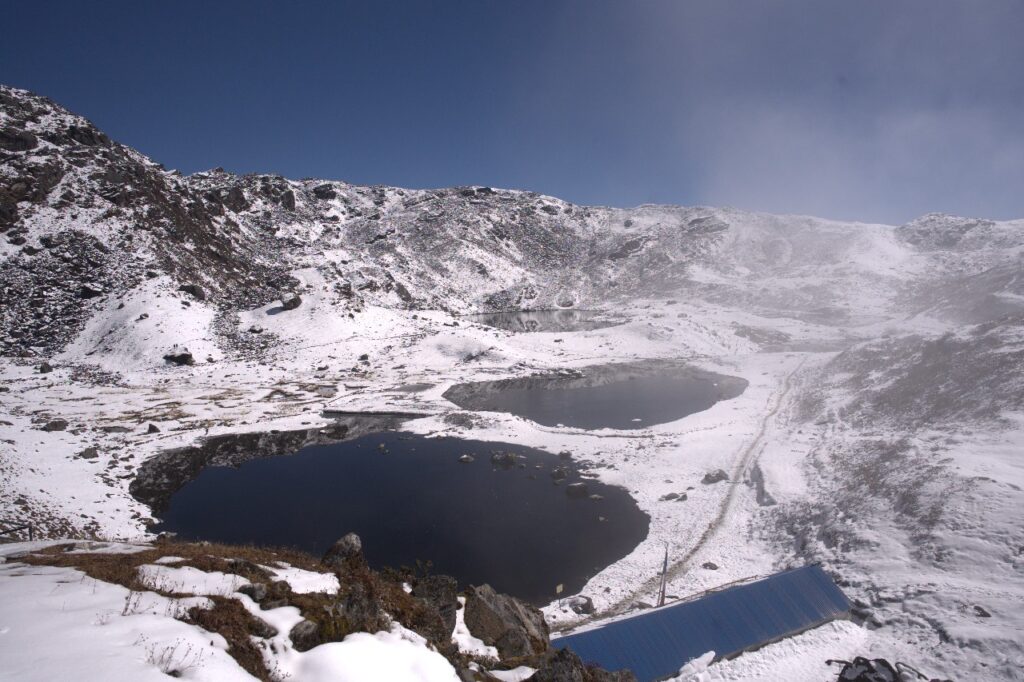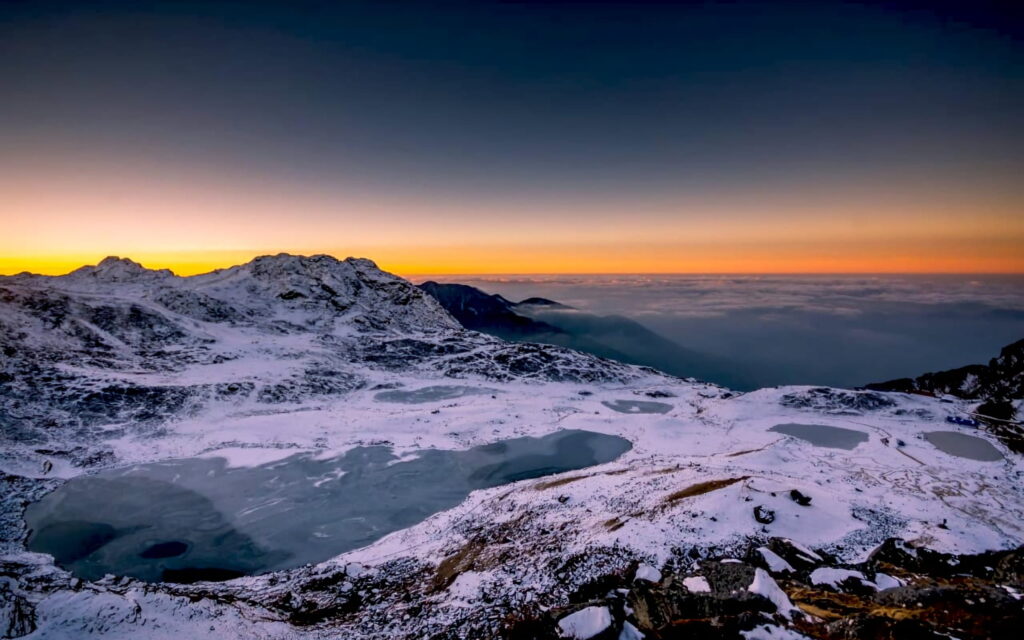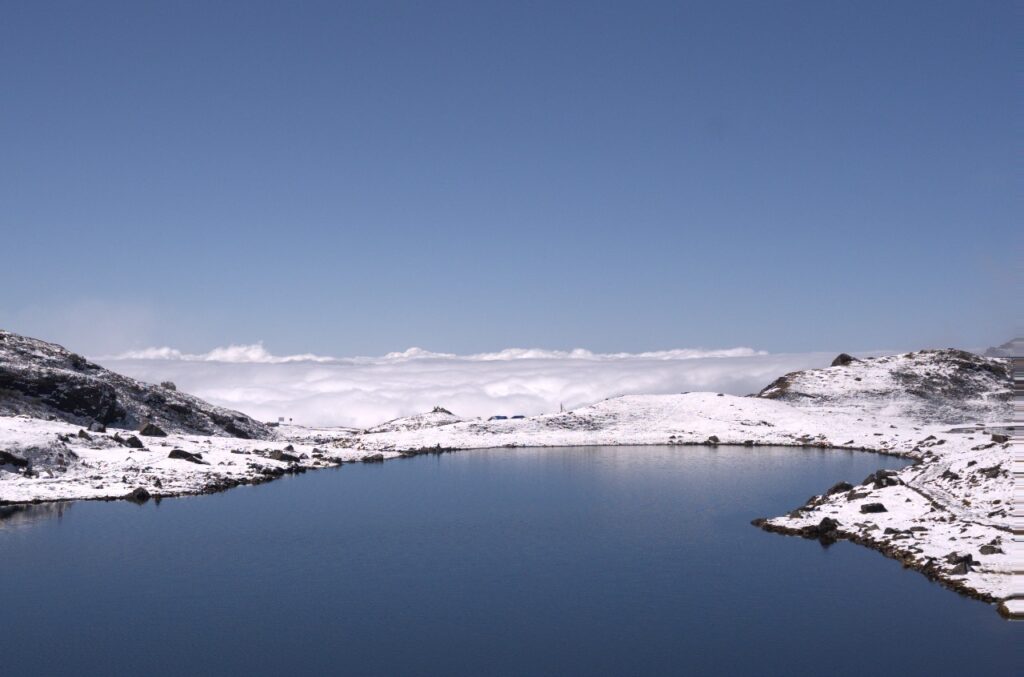Divya Adhikari
Discover the breathtaking beauty and cultural richness of Panch Pokhari, nestled high in Nepal’s Sindhupalchowk district. However, this peaceful spot is facing serious problems because of climate change. From disappearing snow to landslides, uncover how global warming is reshaping this cherished destination—and why its future depends on collective action.

German summary: Panch Pokhari, ein heiliger Ort in Nepal auf 4.100 Metern Höhe, ist bekannt für seine natürliche Schönheit und kulturelle Bedeutung. Die Region, ein beliebtes Ziel für Wanderer und Pilger, leidet jedoch zunehmend unter dem Einfluss des Klimawandels. Steigende Temperaturen, unvorhersehbares Wetter und weniger Schnee gefährden die empfindliche Natur. Häufigere Erdrutsche erschweren den Zugang und bedrohen die dort lebende Bevölkerung. Die Veränderungen beeinflussen auch den Tourismus als wichtige Einnahmequelle.
Panch Pokhari bleibt ein beeindruckendes Reiseziel, doch die sichtbaren Folgen des Klimawandels machen den dringenden Handlungsbedarf deutlich. Die Region steht sinnbildlich für die Auswirkungen der globalen Erwärmung und ohne gezielte Gegenmaßnahmen droht Panch Pokhari seine einzigartige Schönheit und kulturelle Bedeutung zu verlieren.
Clear blue five ponds surrounded by green hills-Panch Pokhari (5 lakes) is 4,100 meters above sea level in the Sindhupalchowk district, northeast of Kathmandu Nepal. It is a peaceful retreat and sacred site for Hindus and Buddhists. Known for its natural beauty and cultural significance, the area attracts trekkers and pilgrims, especially during the Dashain (festival in Nepal) vacation and the Janai Purnima festival (Hindu religious festival) in August.
While the serene lakes and rich Tamang (ethnicity) culture make Panch Pokhari a special destination, the region is increasingly feeling the impacts of climate change. Rising temperatures, unpredictable weather, and shifting snow patterns are pressing on the region’s fragile environment.

Disappearing Snow and Changing Weather
Local residents have noticed significant changes in Panch Pokhari’s climate over recent years. Doma Sherpa, who lives on the trekking route, describes the alarming lack of snow. “It’s been three years since it last snowed in Deurali (place),” she explains. “Snow used to be common all the way to Khimti (place), but now it doesn’t snow when it should. It’s neither too cold nor too hot anymore.”
This shift in weather patterns is reshaping the region’s environment. What was once a reliably cold and snowy area has become increasingly unpredictable. The absence of snow affects not only the landscape’s beauty but also its delicate ecological balance.
Landslides and Environmental Instability
The warming climate is also leading to more frequent landslides, which pose a threat to both the trails and the local communities. These landslides complicate access to Panch Pokhari and increase the risks for travelers and locals.
Unpredictable weather adds another layer of difficulty, disrupting traditional trekking seasons and creating uncertainty for those who depend on tourism for their livelihoods.



Tourism Amid Climate Pressures
Tourism, while providing steady income for the region, has also been influenced by these changes. Manveer Tamang, who has been running a hotel in Tupi Dada (place) for 15 years, notes a shift in visitor patterns. “Earlier, people would only come during Janai Purnima, but now tourism is more stable,” he says. “This year, the snowfall came early, but last year, it was very late.”
Even as tourism grows, it brings its own challenges to Panch Pokhari’s fragile environment. Increased foot traffic and resource demands put additional pressure on an area already struggling with the effects of climate change.
A Delicate Balance
Panch Pokhari remains a breathtaking destination, but the visible impacts of climate change underscore the need for urgent attention. The disappearing snow and shifting weather clearly indicate how global warming affects even remote and sacred places.
For those who visit Panch Pokhari, it’s not just a trek—it’s an opportunity to witness the impacts of climate change firsthand and reflect on the need for collective action. Panch Pokhari stands as both a treasure and a warning. Without immediate efforts to address the challenges posed by climate change, this serene haven risks losing the very qualities that make it so special.
